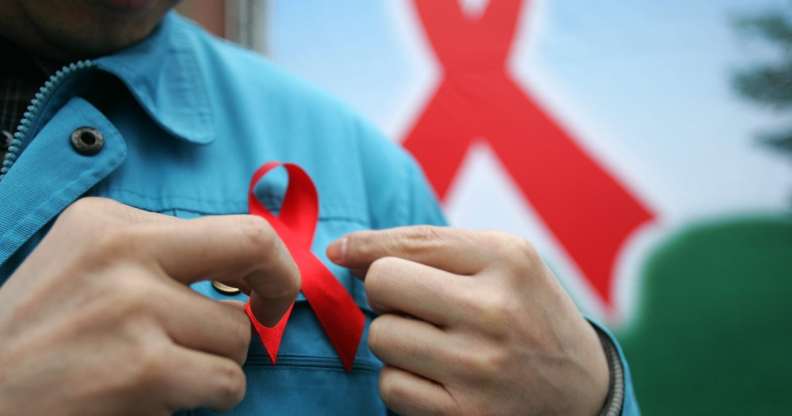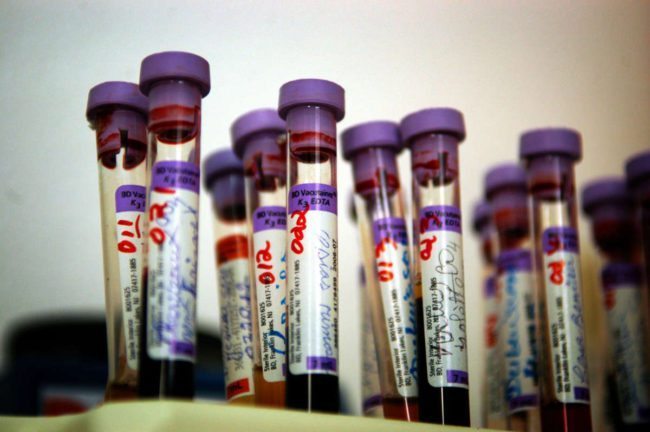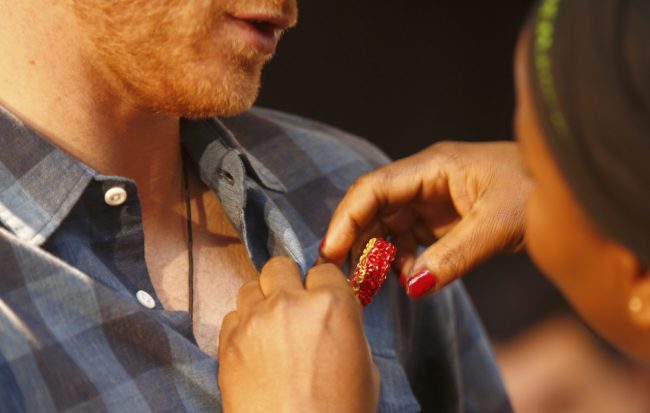World AIDS Day 2018 theme: Everything you need to know

A worker wears a red ribbon for World AIDS Day (China Photos/Getty)
World AIDS Day is marked each year on December 1, and globally, individuals and governments are contributing by spreading awareness and donating to the cause.
The purpose of Worlds AIDS Day is to educate people about HIV to reduce further people from catching the illness, to reduce the stigma surrounding those who live with it, and to raise money for research.
Word AIDS Day is the time for people around the world to come together in their fight against HIV, and give AIDS victims the support they need. It’s also the date dedicated to commemorate those who have passed away from the virus.
World AIDS Day: 30th anniversary
World AIDS Day was founded by James W. Bunn and Thomas Netter in 1987 and they agreed that the first observance should be on December 1. World AIDS Day has therefore been commemorated on December 1 since 1988, making this year its 30th anniversary.
World AIDS Day: ‘The moment I found out I was HIV positive’
Watch this video for their stories.
World AIDS Day 2018 theme: Know your status
Each year, the campaign has a specific theme. The World AIDS Day 2018 theme is “Know your status.” Last year, the World AIDS Day theme was “My Health, My Right.”
Know your status: What does it mean?
The 2018 theme “Know your status” highlights the importance of people getting tested for HIV.
The reason behind this year’s important theme is due to a report by UNAIDS highlighting that only 75 percent of people living with HIV are aware of their status, meaning that that 9.4 million people aren’t aware that they’re HIV-positive as they haven’t been tested.

People are encouraged to get blood tests. (Getty)
This year, we want to encourage people to go to the doctors and get a blood test, as many people who live with the illness aren’t aware of it and unknowingly spread the disease further from unprotected sex.
What can you do for World AIDS Day?
Due to the theme, you should definitely use the day to get tested yourself as you can never be too careful. Encourage others to get tested too, as there’s no shame in doing so.
Help in the fight to erase stigma and discrimination against HIV victims, raise money for vital research, and highlight to the public and government for the need to higher education.
The red ribbon (and red products)
People can show solidarity by red, or more specifically, by wearing the iconic red ribbon for HIV awareness. The red ribbon is a symbol that you support the cause, and you can get it at various charity stores or online.
Where did the red ribbon come from?
In 1991, there was a huge stigma surrounding those who had HIV. But thankfully, 12 artists recognised the need for change. They met to initially discuss a project for Visual Aids, a HIV-awareness art organisation in New York.

Prince Harry receiving his personally made red ribbon brooch to support HIV victims (Peter Nicholls/Getty)
It was during their meeting that they came up with the symbolic red ribbon—something for caring people to wear, signifying their support.
The artists distributed the red ribbons themselves. During this time, there was text on the ribbons explaining the meaning behind it.
In mere weeks, they could be seen everywhere including on celebrities who walked down the red carpet. Soon, the text wasn’t needed at all as the symbol was crystal clear.
HIV statistics: How many people have died from AIDS?
AIDS was first recognised as an illness in 1984, making it only 34 years old (that we officially know of).
The virus quickly became one of the most deadly pandemics, with over 35 million recorded deaths.
Thankfully, there is now successful HIV treatment and laws to protect victims of the illness. Still, more awareness must be spread.
HIV statistics: How many people live with HIV?
There are approximately 36.7 million people who live with the illness around the world.
In the United Kingdom alone, there are 101,000 people living with HIV. According to the Bournemouth Echo, there are twice as many residents in Bournemouth who live with HIV in comparison to the national average (2013).
And despite so many AIDS campaigns, each year in the United Kingdom, approximately 5,000 people still get diagnosed with HIV.
The UK’s achievement with HIV prevention targets in 2018
However, the UK is one of the first countries to meet UNAIDS targets for HIV prevention. Public Health England (PHE) found that there was a great decrease in new HIV diagnoses in the UK with 4,363 new cases diagnosed in 2017, representing a 17 percent decrease.
This shows that we’re taking a step in the right direction, and each year, we hope the drop continues.
Get involved by contacting your local clinic, and show your support with the red ribbon.

